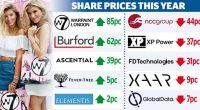
In this series, we bust the jargon and explain a popular investing term or theme. Here it’s PIK Financing.
What is this?
PIK stands for payment in kind, a type of financing where corporate borrowers aim to save money by not paying interest during the term of the loan.
In return, they agree to pay a much higher-than-average rate of interest. They may also agree to take on more debt. Borrowers aim to renegotiate the terms of the loan at some point in the future, with the hope that they can switch to a lower rate of interest.
So attractive is the proposition to borrowers that the PIK finance market is worth about $73billion – and set for further growth.
This sounds risky…
You’re right about that. As a recent Bloomberg report shows, a PIK loan with a 16 per cent rate of interest can double in size in five years. But the popularity of the arrangement has been boosted by steep increases in interest rates, which is why we are reading about PIK loans at the moment.

Shake on it: So attractive is the proposition to borrowers that the PIK finance market is worth about $73billion – and set for further growth
Which lenders offer PIK loans?
US private equity giants, like Apollo and Ares, have private credit divisions offering this type of borrowing, competing with the big banks for the lucrative opportunity to finance takeovers. This is raising the ire of the big banks who say that these private equity lenders are ‘fair-weather friends’ who are only interested in successful businesses, but would shun struggling companies that need a helping hand when trouble hits such as during the Covid era.
Who is taking out these loans?
In the news is the private equity group Carlyle which is in the process of acquiring parts of the medical equipment company Medtronic in a $7billion transaction. The private credit players vying to provide the cash are said to have been offering a PIK element in their loan packages, at interest rates about five percentage points above the Sofr (secured overnight financing rate) giving a rate of about 11 per cent. The Fed fund rate (the equivalent of the UK bank base rate) is 5.5 per cent.
Haven’t PIK loans been around for while, though?
This type of financing has been around for decades, being widely used in the deal-making boom of the 1980s. The Glazers, the American business dynasty, used a series of PIK loans to acquire Manchester United in 2005.
The loans which carried a 16.25 per cent rate of interest were made by three hedge funds: Citadel, Och-Ziff Capital Management and Perry Capital.
Huge controversy surrounded this aspect of the takeover, given the debt burden that this is represented for the club. The loans were cleared in 2010.
What does this mean for the UK?
The availability of PIK finance suggests that more private equity predators will be on the prowl, hoping to buy British businesses on the cheap, having already swallowed up a number of big names for next-to-nothing.
The companies snapped up this year include Dechra, the veterinary pharmaceuticals group, which is being bought by a Swedish private equity group.
A number of names are cited as potential targets, including the online fashion retailer Asos. Thanks to PIK financing, the UK stock markets could shrink further, inflicting wider damage on our economy.








